This has been the summer of surveillance. The Edward Snowdon affair, the Bradley Manning trial, and WikiLeaks have dominated the news and prompted lots of conversations about privacy and surveillance.
How much privacy are we guaranteed? How much do we need? How much do we willingly give up? Did the events of September 11, 2001 change how we must think about the right to privacy?
All of us who use retail bonus or frequent customer cards, or have bought anything from Amazon know that our purchasing habits are well-known. Many of us willingly offer up all kinds of information about ourselves, including photos, on Facebook and other social media. But – in these examples we control what information we put other there (or at least we think we do).
How do you feel about finding out that the National Security Agency (NSA) has collected information on all of the phone calls you have made. What information? Metadata. What are metadata? We librarians thought you’d never ask! Metadata are pieces of information that describe or help locate other information. In the library authors’ names or titles (or even individual words in titles) are types of metadata. So are the descriptor words we use to describe the content of an article or book. The metadata you have been reading about in the news includes lots of information about the phone calls you make, but not the actual conversations you have had.
But there is metadata about you, too, if you have every borrowed something from the library. We can tell how many SMCM undergraduates borrowed SMCM books, we can tell how many times a particular book or DVD has been loaned, but most libraries scrub the specific data about who borrowed a particular book. In fact, the Annotated Code of the State of Maryland states that your library record is confidential and not subject to scrutiny even by a Freedom of Information Act request.
The USAPatriot Act changes all that in some ways. It says that the FBI can require us to given them information about what you library materials you have borrowed (if the Foreign Intelligence Surveillance Court gives permission) and that we are not permitted to tell you that you are being investigated.
We think what you read, or watch, or listen to, is your business. Does it matter to you? Would it matter to your employer that you have been reading about how to get unions into a workplace? Would it matter to the government that you have been reading about anarchy? Should it?
The librarians’ code of ethics has been based on reader confidentiality since 1939. Some of the metadata can be very useful. We want to know if that book on anarchy has been borrowed 5 or 15 or 50 times in the past ten years. But we don’t want to know who has been reading it.
Keep your eye on the surveillance debate. This is about more than which brand of frozen peas you bought, or the banana slicer you purchased on Amazon, or the book on socialism you borrowed from the library. In the meantime, we’ll keep working hard to protect your privacy.

Pingback: Too Awesome Not to Share | Beyond the Bookshelves
Pingback: O Privacy, Where Art Thou? | Beyond the Bookshelves